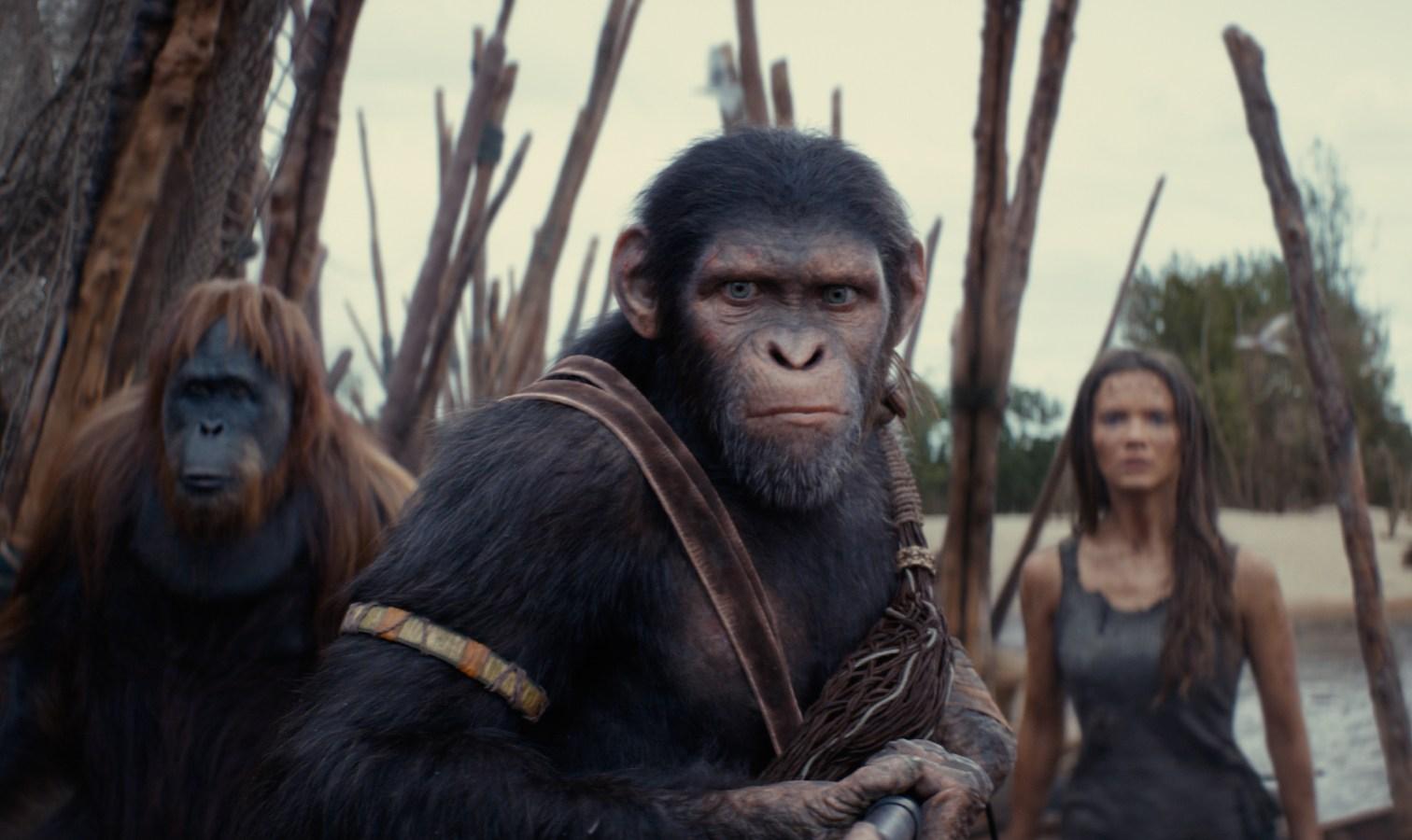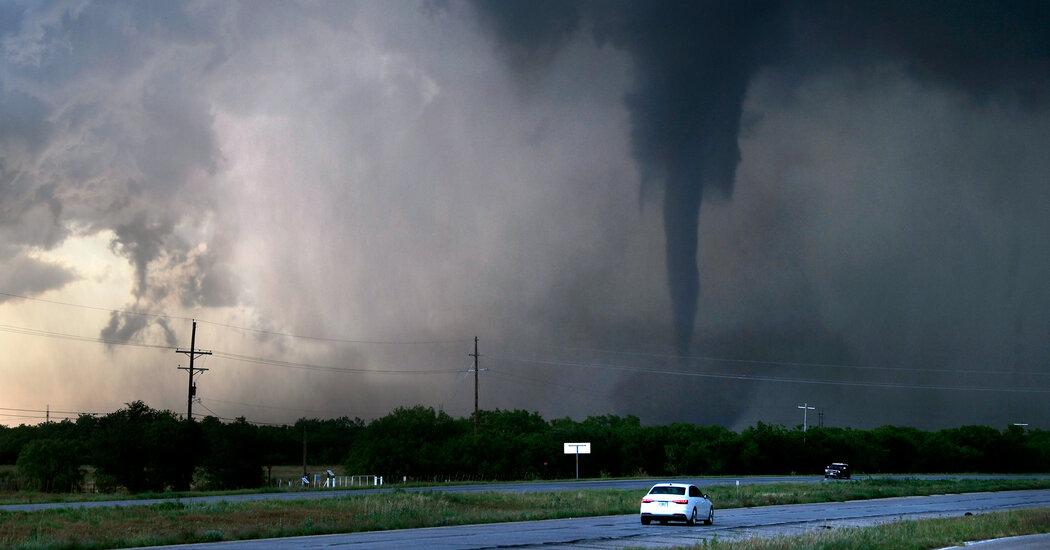Caesar became both the conscience of his species and its spokesperson, empowering his fellow apes while attempting to bridge the gap between primates and people.
Thanks to Serkis, this character became not just a focal point for the franchise but its emotional center, its soul.
Kingdom of the Planet of the Apes, the fourth installment in — what are we calling this, the Apeverse?
Yet a curious sense of staleness starts to set in even before the first act of director Wes Ball’s entry pits ape against ape.
He’s twisted the words of their simian savior to his own ends, turning “Apes, Strong, Together!” into a campaign motto.
To put it bluntly: It’s a big evolutionary step backward for a franchise that distinguished itself from the barrel of blockbuster I.P.
Kingdom of the Planet of the Apes may bring its battle against humans and apes to something like a draw here, but it certainly loses the war over maintaining your interest.
Because given what we’ve got left without him leading the charge, the only thing concerning viewers regarding this Planet of the Apes entry is how quickly you can escape it.
You could feel a familiar cynicism set in when it was first announced in the now-classic year of 2011 that the Planet of the Apes franchise was getting a reboot: Great, another recognizable intellectual property getting trotted out for a quick cash grab, just in time for a corporate quarterly report. After we managed to eradicate the bitter aftertaste of the misguided Tim Burton remake from 2001, Warners was returning to the ’70s pop culture scene, prepared to resurrect musty nostalgia from chimpanzee A to chimpanzee Z. Somewhere, a pasty Gen-X fanatic was beating his apartment floor and screaming, “You’ll blow it all up! Damn you! Damn you all to hell!!!” in front of his rare, still-boxed Dr. Zaius collector’s edition action figure.
Instead, we got the first in a trilogy of highly anticipated films, Rise of the Planet of the Apes, Dawn of the Planet of the Apes (2014), and War for the Planet of the Apes (2017), which cleverly and commercially viable reimagined a world plagued by monkey business. And without a doubt, Caesar was the key to this new series. With the help of state-of-the-art performance-capture effects from Peter Jackson’s WETA Digital Workshop and Andy Serkis’ voice and acting, this animal underwent a heroic transformation from an everyday chimp to a liberator, leader, and martyr. Caesar empowered his fellow apes and tried to close the divide between humans and primates by becoming the conscience and spokesperson of his species. Because of Serkis, this character evolved from the franchise’s main attraction to its emotional core, or soul. The greatest irony is that a technologically disadvantaged actor managed to lend humanity to a whole trilogy about simian supremacy. It is undoubtedly among the greatest long-form screen performances of the twenty-first century.
Kingdom of the Planet of the Apes, the fourth entry in the Apeverse, picks up where War left off, with the powerful Caesar receiving a hero’s sendoff complete with funeral pyre. We then fast-forward “many generations later,” and after a few minutes of exploring this daring new world of backwards, you begin to question whether the void left by this character’s absence can ever truly be filled. There will be new villains to hiss at, heroes to cheer for, and metaphors about corruption, power, and history repeating itself to pick at your chin. However, a strange feeling of staleness begins to emerge even prior to director Wes Ball’s entrance, which pits ape against ape in the first act. And without a captivating chimp for every season, a la Caesar, serving as a centrifuge for all the narrative bathos and allegorical bellicosity, and set pieces where a pixelated gorilla beats a pixelated orangutan and a pixelated tsunami threatens to wash them all into pixelated oblivion, all that’s left is Blockbuster 101 grandstanding. Here we have the most empty monkeyhouse ever.
Editor’s selections.
This time, our hero is a young chimpanzee named Noa (Owen Teague), who lives in a tribe among the lush vegetation-covered ruins of California. Noa and his closest friends, Anaya (Travis Jeffery) and Soona (Lydia Peckham), have just collected nest eggs in the hopes of raising their own birds of prey. Noa’s father is a “master of birds,” having trained eagles to aid in their hunting. They discover an odd-smelling swath of cloth on their way back home. They call the group of human scavengers who dwell in the forbidden “valley beyond” an “Echo,” and they think that’s who it belongs to. “.
When Noa returns, he gives this garment to his father and the village elders. He soon discovers that its owner, Freya Allen, is a wild young woman who is prowling the encampment. Then, under the brutal leadership of Sylva (Eka Darville), a rival ape group attacks the tribe and destroys everything with fire. Any friends or loved ones who have survived are led away and left for dead, with the intention of using them as slave labor for something. With a vow of retribution, he starts to track down these aggressors.
He encounters Raka (Peter Macon), a sage orangutan, along the road. This elder ape belongs to the Order of Caesar, an organization that studies the old human writings known as “books” and takes the words of the long-dead hero as gospel. He recently lost what seemed to be a life partner in a similar massacre, so he is also familiar with these warlike apes. (Noa informs him that they attacked my village. Raka points to a skeleton perched on a bonfire and says, “He was my village.”. The girl soon follows them. The mute child Caesar saves during the War inspired the orangutan to name her Nova. She goes by Mae in real life, and in addition to talking, she is a member of a settlement that aims to bring back the era in which humans and apes coexisted. For personal reasons, she is also motivated to track down these villains.
Similar.
The issue lies in the fact that the bad guys are pursuing her aggressively. Furthermore, in a clear reference to the 1968 film’s finale, after she and Noa are apprehended, they are taken along a beach. Though a rusty, wrecked battleship akin to a Bond villain’s lair awaits them instead of Lady Liberty. Here, Proximus Caesar, a demagogue played by Kevin Durand, is in charge. He has transformed “Apes, Strong, Together!” into a campaign slogan by twisting the words of their ape savior to suit his own purposes. This would-be great ape turns out to be obsessed with a massive vault that is protected by impenetrable steel doors, as Noa finds out. It is brimming with technological and human weaponry. Caesar 2.0 bemoans how damned slow Darwinism moves. However, he believes he can surpass humans much faster in terms of obliterating everything and everyone in his path thanks to the riches hidden inside that walled area.
Currently popular.
There are more, like William H. and Mae’s dual agendas and their imprisonment next to Noa. Macy stopping by to perform as the futuristic equivalent of a Vichy government official in WWII. Before anything approaching order is restored, our heroes suffer blows to the face, make sacrifices, perform last-minute rescues, and experience a litany of computer-generated disasters. Although it’s not particularly novel, the idea that a prophet’s teachings are corrupted for a power-hungry individual’s benefit will resonate with anyone who has studied organized religion and the last 50 years of the G. Oh. P. And while the trilogy imagined how the ape revolution transpired using the idea behind Pierre Boulle’s 1963 cult novel and that original five-movie run, Kingdom is the first of the reboots to essentially take the monkeys-are-our-masters scenario for granted. Everything about it is similar to the 1968 Charlton Heston ground zero for the series, with the exception of quality, excitement, and capturing your interest in any kind of conclusion.
Simply put, it represents a significant step backward in the evolution of a franchise that set itself apart from the blockbuster I. P. filling up the multiplex and your pop-culture bandwidth a little more than ten years ago, and had managed to maintain a consistency among multi-movie universes that felt increasingly uncommon. In this fight between humans and apes, Kingdom of the Planet of the Apes may come to a close, but it loses hands down in the battle of keeping your attention. Although Serkis was a consultant on this project, it would be amazing to see him in front of the camera once more, working his special brand of performance-capture spell. The only thing that should worry moviegoers about this Planet of the Apes installment is how quickly you can get out of it, considering what’s left without him leading the charge.




